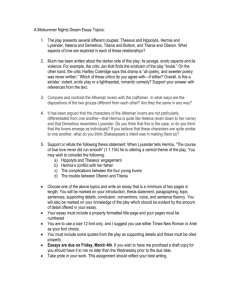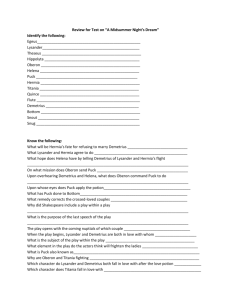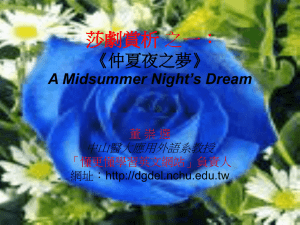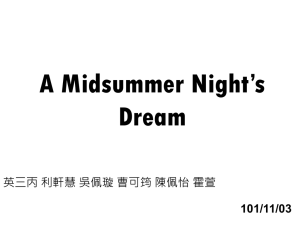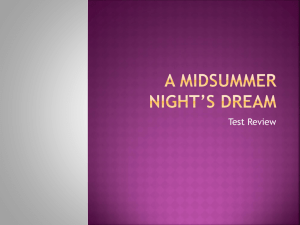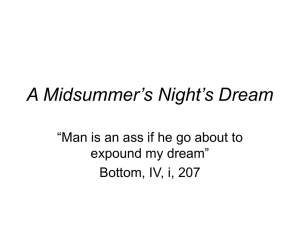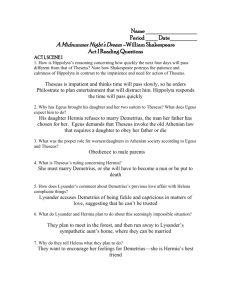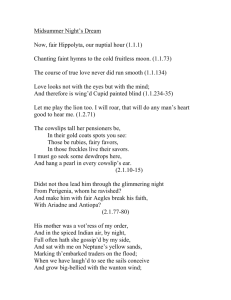Love and quotes
advertisement
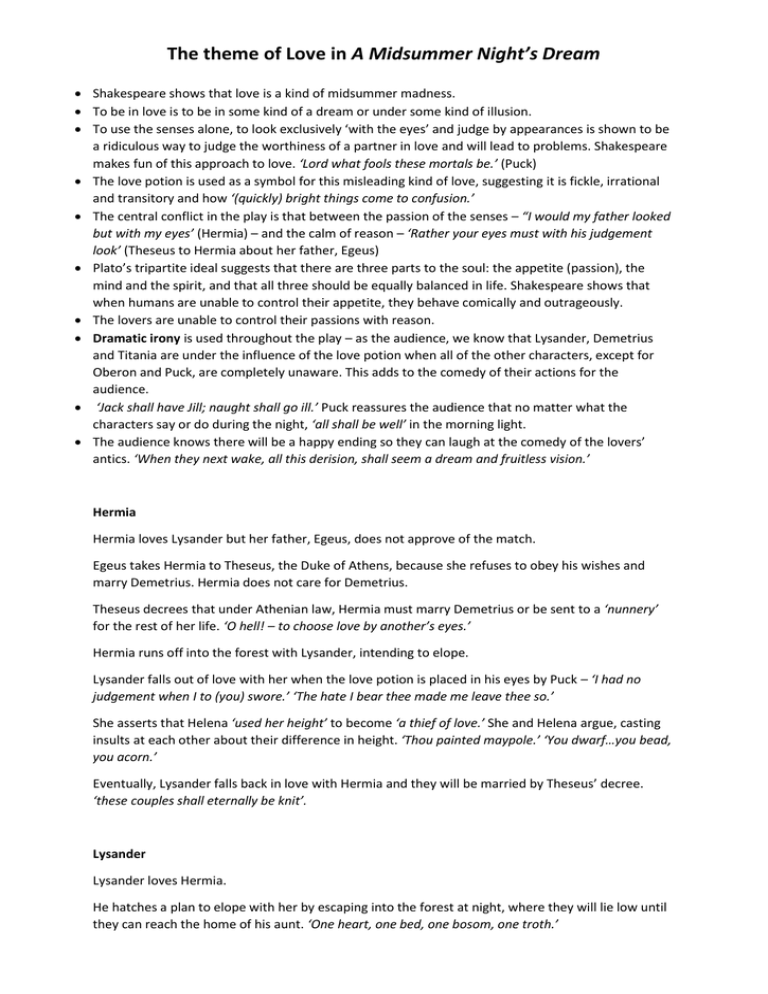
The theme of Love in A Midsummer Night’s Dream Shakespeare shows that love is a kind of midsummer madness. To be in love is to be in some kind of a dream or under some kind of illusion. To use the senses alone, to look exclusively ‘with the eyes’ and judge by appearances is shown to be a ridiculous way to judge the worthiness of a partner in love and will lead to problems. Shakespeare makes fun of this approach to love. ‘Lord what fools these mortals be.’ (Puck) The love potion is used as a symbol for this misleading kind of love, suggesting it is fickle, irrational and transitory and how ‘(quickly) bright things come to confusion.’ The central conflict in the play is that between the passion of the senses – “I would my father looked but with my eyes’ (Hermia) – and the calm of reason – ‘Rather your eyes must with his judgement look’ (Theseus to Hermia about her father, Egeus) Plato’s tripartite ideal suggests that there are three parts to the soul: the appetite (passion), the mind and the spirit, and that all three should be equally balanced in life. Shakespeare shows that when humans are unable to control their appetite, they behave comically and outrageously. The lovers are unable to control their passions with reason. Dramatic irony is used throughout the play – as the audience, we know that Lysander, Demetrius and Titania are under the influence of the love potion when all of the other characters, except for Oberon and Puck, are completely unaware. This adds to the comedy of their actions for the audience. ‘Jack shall have Jill; naught shall go ill.’ Puck reassures the audience that no matter what the characters say or do during the night, ‘all shall be well’ in the morning light. The audience knows there will be a happy ending so they can laugh at the comedy of the lovers’ antics. ‘When they next wake, all this derision, shall seem a dream and fruitless vision.’ Hermia Hermia loves Lysander but her father, Egeus, does not approve of the match. Egeus takes Hermia to Theseus, the Duke of Athens, because she refuses to obey his wishes and marry Demetrius. Hermia does not care for Demetrius. Theseus decrees that under Athenian law, Hermia must marry Demetrius or be sent to a ‘nunnery’ for the rest of her life. ‘O hell! – to choose love by another’s eyes.’ Hermia runs off into the forest with Lysander, intending to elope. Lysander falls out of love with her when the love potion is placed in his eyes by Puck – ‘I had no judgement when I to (you) swore.’ ‘The hate I bear thee made me leave thee so.’ She asserts that Helena ‘used her height’ to become ‘a thief of love.’ She and Helena argue, casting insults at each other about their difference in height. ‘Thou painted maypole.’ ‘You dwarf…you bead, you acorn.’ Eventually, Lysander falls back in love with Hermia and they will be married by Theseus’ decree. ‘these couples shall eternally be knit’. Lysander Lysander loves Hermia. He hatches a plan to elope with her by escaping into the forest at night, where they will lie low until they can reach the home of his aunt. ‘One heart, one bed, one bosom, one troth.’ The theme of Love in A Midsummer Night’s Dream Puck mistakenly places the love potion in Lysander’s eyes. Upon waking, he falls madly in love with Helena, the first person he sees. Lysander tells Hermia he hates her as a ‘vile thing’ when he is under the influence of the spell. ‘Not Hermia but Helena I love.’ He wishes to fight Demetrius to win Helena’s love. Though ‘The course of true love never did run smooth, ‘Eventually, Lysander falls back in love with Hermia and they will be married by Theseus’ decree. Helena Loves Demetrius but her love for him is unrequited. She will do anything to fall into his favour - ‘I will go tell (Demetrius) of fair Hermia’s flight.’ She pursues him into the forest where she tries to convince him to love her. Helena runs into a sleeping Lysander, whom upon waking falls in love with her. She eventually gets her wish when Demetrius falls passionately in love with her, professing his feelings over and over. Helena does not believe him. She thinks that with Lysander and Hermia, he is playing a nasty trick on her. ‘I see you are all bent to set against me for your merriment.’ She turns on ‘injurious Hermia’ vehemently, accusing her of an unsisterly disloyalty and mocking her height. Demetrius Loves Hermia and wishes to marry her. He does not love Helena, whom loves him madly, saying to her that he is ‘sick when I do look on thee.’ He rejects her advances constantly ‘I do not nor I cannot love you.’ Puck places the love potion in Demetrius’ eyes, whereupon waking he sees Helena and instantly falls in love with her. ‘My love to Hermia melted as the snow…the object and the pleasure of mine eye, is only Helena.” This love does not change as he is not given the antidote by Puck at the end of Act 4. Does this mean his love for Helena is actually real? Titania & Oberon When we meet them in Act 2 Scene 1, she and Oberon are fighting because she will not give him the changeling boy. ‘I have forsworn his bed and company.’ The theme of Love in A Midsummer Night’s Dream ‘Proud Titania’ and ‘jealous Oberon’ are in a power struggle which is having serious repercussions on the physical world. Titania blames Oberon for all of the cosmic disorder, the ‘contagious fogs’ and the ‘rheumatic diseases’, that ‘the seasons alter’ because he will not see reason. She believes that Oberon is infatuated by Hippolyta and he is resentful of her ‘love to Theseus’ – it is interesting that the fairy king and queen are so enamoured of their human counterparts. Oberon plays a revenge trick on Titania, using the love potion to make her fall in love with ‘the next thing then she, waking, looks upon’. This happens to be Bottom the weaver, transformed into ‘an ass’. ‘My mistress with a monster is in love.’ - Puck Using Bottom to represent a hideously ugly being, Shakespeare emphasises the absurdity of love when the senses alone are used to define it. Shakespeare seems to be saying that if we are blinded to the reality of our lovers, and only see that which is clouded through the magical aura of love, then our judgements are likely to be flawed. Bottom says ‘…truth, reason and love keep little company together nowadays –‘ It is ironic that it takes an ass to see the truth. Oberon eventually releases Titania from the spell and they are reconciled. Theseus and Hippolyta Theseus loves Hippolyta, whom he is to marry in ‘four days’. Theseus represents the other side of love, the side of cool reason or logic. ‘How easy is a bush supposed a bear?’ He is willing to reduce the severity of Hermia’s punishment if she chooses not to marry Demetrius, from death to life in a nunnery, but insists she follows the law of Athens and submit to her father’s will. He finds the four lovers in the wood and wonders how they came to be there. He cannot believe their story: ‘Lovers and madmen have such seething brains.’ He decrees that ‘these couples shall eternally be knit’, in other words, they will all be married. But will they live happily ever after? Topic sentences Unrequited love The fickle nature of love The impact of jealousy on love The superficiality of love Love makes fools of us all Immature love cannot compare to mature love Positive outcomes of facing problems in love We lose all sense of reason when we are in love Despite the turmoils, love is worth pursuing or fighting for Though love can bring conflict, it can also bring great joy
